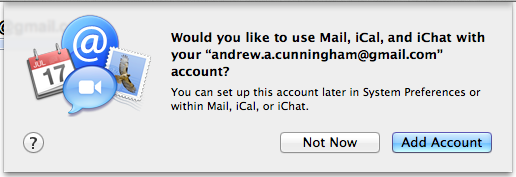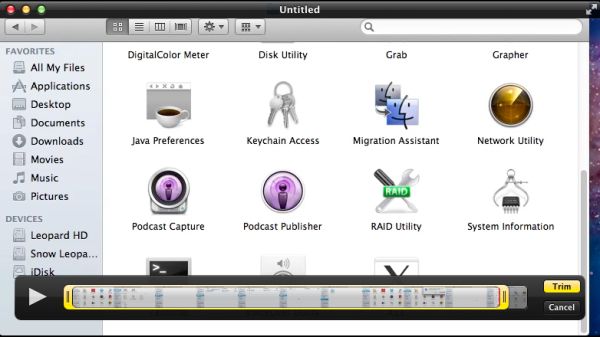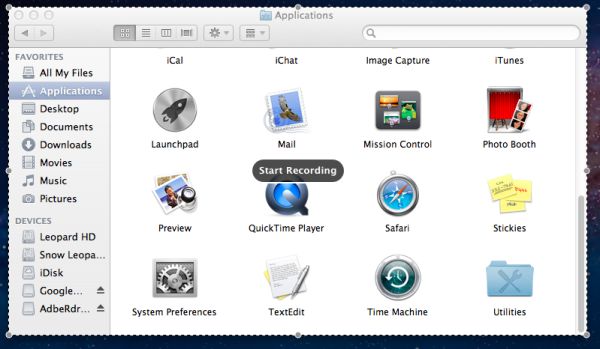Back to the Mac: OS X 10.7 Lion Review
by Andrew Cunningham, Kristian Vättö & Anand Lal Shimpi on July 20, 2011 8:30 AM ESTSafari
Snow Leopard is going to get the new Safari 5.1 when it comes out, so its users will be able to take advantage of JavaScript performance gains, support for new standards, and the security patches included in most new browser releases. In Lion, however, Safari gains a few new OS integration features that probably won’t be backported.
The best of these is a new download manager, which instead of being a separate window (IE, Firefox) or tab (Chrome) is a clickable drop-down window located in the upper right-hand corner of the browser window. Initiating a new download makes the file visually fly up to the button (more of OS X’s visual frippery), and you click this button to check on your downloads’ status (a small progress bar is visible at all times to give you a general sense of how your downloads are going).

As a heavy Chrome/Firefox user, I hope Google and Mozilla are paying enough attention to create their own versions of this.
The second is less interesting, but still useful - logging into a recognized email service (such as Gmail or Yahoo!) will invoke a dialog box asking you if you’d like to setup the account with OS X - this will sync your mail, calendar, and contacts for you (if the services are available from your email provider).

This generally works pretty well if you want to use the client apps, though I prefer to stick to web clients where possible.
iChat
iChat is still largely the same program it has been for some time, but it adds some enhancements it needs to protect itself from web clients (Google Talk, Facebook Chat) on one hand and existing third-party all-in-one clients (Adium, Trillian) on the other. It's all about adding support for different chat protocols, and to this end iChat in Lion adds support for Yahoo! Messenger and video chat, and also for the addition of other protocols via plug-ins. These plug-ins need only be downloaded and double-clicked to be installed.

In use, iChat now presents you with a unified buddy list, with friends across all protocols showing up in one window instead of multiple windows. Conversations with different people show up in a single, vertically tabbed chat window (see above), which allows you to easily switch between conversations without switching between windows. You can break these out into separate windows by clicking and dragging the tabs, same as with most modern web browsers.
TextEdit
OS X's built-in text editor gets a couple of small enhancements: for one, it gains a more useful formatting bar, which is a nice change, and it also gains Versions support.

Despite these enhancements, anyone who needs to do real word processing is still going to install Word or Pages at his or her first opportunity. It's certainly nice to have a built-in program that includes basic support for most document file formats, but it's not exactly a replacement for a real word processor.
Preview
Preview in Lion adds Versions and full screen support, along with a new "Import from camera" feature, which will let you (among other things) take a picture of your signature with your iSight/FaceTime camera to sign PDF forms.
QuickTime X
QuickTime X, now at version 10.1, can cut, copy, and paste video and audio, restoring a missing piece of QuickTime Pro functionality that was much missed when Snow Leopard launched. It also gains the ability to trim, crop, rotate and resize video, as well as insert other videos - all of this makes QuickTime X more capable of serving as a basic video editor. Full screen support is also available; Versions support is not.
Trimming a video in QuickTime X
The screen recording feature can now be trained onto a single area of the screen, rather than just the whole screen - this mirrors the OS’s ability to do screen captures of a single window rather than the full screen. Simply invoke the screen capture feature and drag a box around the window you want to record.
Selecting a portion of the screen to record
Sidenote: Can anyone tell me when Apple plans to replace QuickTime 7 for Windows users? Seriously, if Apple could deliver something like this for Windows, QuickTime would go from being “that thing that installs with iTunes” to a really useful program. It doesn’t seem likely or anything, but I’m just saying...












106 Comments
View All Comments
quiksilvr - Wednesday, July 20, 2011 - link
$29 is indeed a solid improvement. However, given the Mac Store now being out there, their desktop OS should follow the formula of their mobile OS: Free to upgrade. These features are nice but I can't help shake the feeling that these are Service Packs (because they are). And with their "app" store available on the OS and the means of most of their cash inflow, it makes more sense to make this a free upgrade for everyone instead of a $29 upgrade.xype - Wednesday, July 20, 2011 - link
Service packs? Are you serious? Read up on the changes and try to come up with one service pack that changed as much.Some people…
danielkza - Wednesday, July 20, 2011 - link
XP SP3 would be a good candidate, but yes, 10.7 is a bit beyond what one could reasonably call a Service Pack.Taft12 - Wednesday, July 20, 2011 - link
You're thinking of XP SP2, and if you have to go back 7 years to come up with a comparable "service pack", it's certainly fair to say OSX 10.7 is more than a service pack.AfroPhysics - Friday, July 22, 2011 - link
I fail to see how the age of the service pack matters. Xype asked for an example and qualified nothing.ltcommanderdata - Wednesday, July 20, 2011 - link
Are we really going through the tired argument that every 10.x update to OS X is just a service pack and should be free? Then at what point should Apple try to recoup costs for OS development, because even if individual point updates are evolutionary, going from the original 10.0 to 10.7 has got to be a major change in anyones eyes. And the same questions could be raised about Windows NT 6.1 aka Windows 7 where the server version is bluntly labeled Windows 2008 R2 and Windows NT 6.0 aka Vista/2008 or Windows NT 5.1 aka XP and Windows NT 5.0 aka 2000.Besides, even if you discount the user facing changes, Lion has seem some major security infrastructure changes. Both the 32-bit and 64-bit kernel have been rewritten with full NX-bit and ALSR support as in place in Windows Vista/7 addressing the major security complaint Charlie Miller had with OS X. Application sandboxing frameworks are now available and soon to be mandatory for Lion apps in the Mac App Store which I believe is a security feature that even Windows isn't pushing yet. With the dropping of the Core Duo, the Lion has also be rewritten to make more use of SSSE3 instead of just SSE3 as pointed out by the Hackintosh community. Lion isn't just Snow Leopard with a few features added on top, but the entire OS has seem updates at a low level even if the user might not necessary see all the differences.
ltcommanderdata - Wednesday, July 20, 2011 - link
And about the App Store being a major source of income for Apple, Apple has consistently said they aim to run their stores as a break even venture.http://www.macrumors.com/2011/07/19/apple-reports-...
I'm not clear if the iTunes Store in the graphic in the above link includes the App Store, but at the very least as an example of Apple's digital store, the revenue stream really hasn't increased in the last 2 years. Apple's sales growth is clearly from their hardware, iPhone, iPad, and even Mac.
GotThumbs - Wednesday, July 20, 2011 - link
$1,634,000,000 in revenue from Other Music Related Products and Services (3)(3) Includes sales from the iTunes Store, App Store, and iBookstore in addition to sales of iPod services and Apple-branded and third-party iPod accessories
I'd say their goal of a break even venture is not an accurate description of their stores. Hence the creation of the MAC Store. It sounds like a nice thought, but Apple is in business to make money and it seems their VERY good at it. Perhaps their projection analysis was a bit off.
Hey, this is good news for the investors and I understand that they are a business. Lets not be too naive and just don't drink the cool-aid.
ltcommanderdata - Wednesday, July 20, 2011 - link
Perhaps my finance terms are wrong, but I'd hope the Apps Store is taking in revenue. But if Apple should be offering some of their other products like OS X updates for free, shouldn't we be concerned with whether the App Store is making major profits, such that there is money to spare to pay for OS development?solipsism - Wednesday, July 20, 2011 - link
Revenue ≠ ProfitThey've paid billions to both developers, and music and video cotent owners. They've also spent money on the infrastructure to support their stores. I'm sure they're making a profit as all good for-profit companies should, but it's not the cash cow you've attempted to present here.